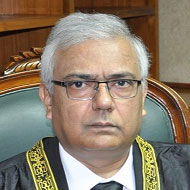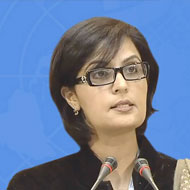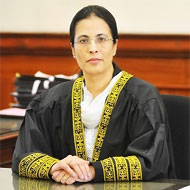Home > Quotes
QUOTES

![]() We must also not lose sight of a most startling fact. Pakistan is amongst a score of
countries which are disproportionately vulnerable to the consequences of climate change.
To ignore the reality of climate change is to be unjust and it disregards future generations.
We must also not lose sight of a most startling fact. Pakistan is amongst a score of
countries which are disproportionately vulnerable to the consequences of climate change.
To ignore the reality of climate change is to be unjust and it disregards future generations.
![]()

![]() Post climate change, democracies have to be redesigned and restructured to become more
climate resilient and the fundamental principle of rule of law has to recognize the urgent
need to combat climate change.
Post climate change, democracies have to be redesigned and restructured to become more
climate resilient and the fundamental principle of rule of law has to recognize the urgent
need to combat climate change.
![]()

![]() Climate Justice links human rights and development to achieve a human-centered
approach, safeguarding the rights of the most vulnerable people and sharing the burdens
and benefits of climate change and its impacts equitably and fairly.
Climate Justice links human rights and development to achieve a human-centered
approach, safeguarding the rights of the most vulnerable people and sharing the burdens
and benefits of climate change and its impacts equitably and fairly.
![]()

![]() Women are at a greater risk from natural disasters than men. They are vulnerable and
victims in natural disasters but also play a significant role throughout the disaster
management cycle, without being adequately recognized and included in the decision
making.
Women are at a greater risk from natural disasters than men. They are vulnerable and
victims in natural disasters but also play a significant role throughout the disaster
management cycle, without being adequately recognized and included in the decision
making.
![]()

![]() As climate change litigation gains momentum, legal systems will be faced with the
complex interplay between state responsibilities and adverse environment impacts, as
carbon emissions know no borders, and their ramifications are grossly uneven. The
challenge lies in reconciling the disproportionate burden borne by nations least
responsible for the crisis, yet most affected by its consequences.
As climate change litigation gains momentum, legal systems will be faced with the
complex interplay between state responsibilities and adverse environment impacts, as
carbon emissions know no borders, and their ramifications are grossly uneven. The
challenge lies in reconciling the disproportionate burden borne by nations least
responsible for the crisis, yet most affected by its consequences.
![]()

![]() The right to life can only be enforced if certain ingredients are present, food being the
first and foremost. Pakistan’s Courts have repeatedly held the right to food a necessity of
life and thus an extension of the right to life. Its interpretation has been stretched to the
extent of it being labelled an economic right.
The right to life can only be enforced if certain ingredients are present, food being the
first and foremost. Pakistan’s Courts have repeatedly held the right to food a necessity of
life and thus an extension of the right to life. Its interpretation has been stretched to the
extent of it being labelled an economic right.
![]()

![]() A high population growth and unfavourable water and climatic conditions in the country
has led the country towards an alarming state regarding food security and this situation
may worsen manifolds in the near future.
A high population growth and unfavourable water and climatic conditions in the country
has led the country towards an alarming state regarding food security and this situation
may worsen manifolds in the near future.
![]()

![]() District Judges should give particular emphasis to consulting relevant conventions on
environmental law and climate change when making decisions in any case. Recognizing
the critical importance of addressing climate change, it is imperative that judicial decisions
reflect and uphold the principles established in these conventions to promote sustainable
and environmentally responsible outcomes.
District Judges should give particular emphasis to consulting relevant conventions on
environmental law and climate change when making decisions in any case. Recognizing
the critical importance of addressing climate change, it is imperative that judicial decisions
reflect and uphold the principles established in these conventions to promote sustainable
and environmentally responsible outcomes.
![]()

![]() All I’d say is this climate crisis is driven by capitalism, colonialism, consumerism, and the
fossil fuel economy, and unless you dismantle them and replace them with something else,
you have no hope to combat the climate crisis.
All I’d say is this climate crisis is driven by capitalism, colonialism, consumerism, and the
fossil fuel economy, and unless you dismantle them and replace them with something else,
you have no hope to combat the climate crisis.
![]()

![]() You cannot, simply cannot, bring about the type of transformational change that the
world needs in the environmental arena without also transforming the systems of
governance that are going to implement that change.
You cannot, simply cannot, bring about the type of transformational change that the
world needs in the environmental arena without also transforming the systems of
governance that are going to implement that change.
![]()

![]() Adopting sustainable means of production and consumption is key to tackle climate
change and its impacts on various socio-economic sectors, particularly water, agriculture,
energy, health and education.
Adopting sustainable means of production and consumption is key to tackle climate
change and its impacts on various socio-economic sectors, particularly water, agriculture,
energy, health and education.
![]()

![]() A key emerging issue in the climate change debate that exemplifies this challenge is food.
A key emerging issue in the climate change debate that exemplifies this challenge is food.
![]()

![]() We need to grow much more food over coming decades.
We need to grow much more food over coming decades.
![]()

![]() To combat the effects of climate change, a transition to a sustainable transportation
system is essential.
To combat the effects of climate change, a transition to a sustainable transportation
system is essential.
![]()































